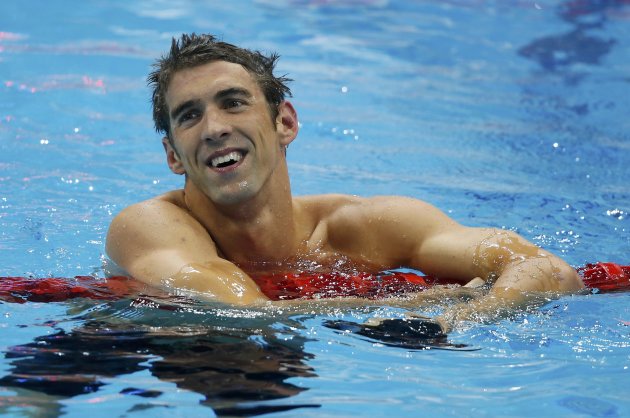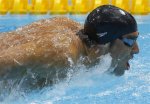LONDON – In the final 10 meters of his history-making race, Michael Phelps was alone in the open – a fitting margin for an Olympic icon who is now the most decorated medal-winner of all time.
Swimming the anchor leg of the men’s 200-freestyle relay, Phelps held onto a significant lead and delivered the United States another gold medal – the 15th of his career and the 19th time he has stood on an Olympic podium. He’s now alone in the overall medal count, having broken a tie with Russian gymnast Larissa Latynina as the most-decorated athlete in the history of the Games.
[Photos: Michael Phelps]
Phelps entered the night with 17 medals, wining silver in the 200-meter butterfly and then gold in the 4x200, swimming the two races a little over one hour apart.
Just before the 4x200 began, Phelps pulled his teammates into a huddle and expressed his gratitude for their part in the moment. He delivered one last request.
"I wanted a big lead," Phelps said. "I told the guys, 'Get me a big lead.' And they gave it to me."
The crowd in London’s Aquatics Centre thundered in applause for much of the race as the United States’ Ryan Lochte – one of Phelps chief rivals in the last four years – got the Americans off to a blazing start. It was a change of sorts for Lochte, who anchored the 4x100 silver medal effort – in which the U.S. was overtaken by the French in the closing moments. This time, U.S. men’s coach Gregg Troy put Lochte in the lead-off leg, offering him an opportunity to get Phelps the lead he desired.
He did just that, swimming the fastest lead-off leg and outpacing the French by 1.55 seconds over the first 200 meters.
"The past two days I wasn’t myself," Lochte said of his sprint struggles in these Games. "After [the 400 freestyle silver medal] my confidence was gone. Everyone kept telling me, 'You’re better than that.' I didn’t swim this morning and I think that helped. I was back to myself. I was that happy-go-lucky guy."
Shortly before Tuesday night's swim meet, Latynina told Yahoo! Sports' Martin Rogers that the medals she also won as a coach still separate her from Phelps.
"Do I think I am still the greatest Olympian?" she said in an interview translated by a Russian gymnastics federation official. "Why yes, but that is my opinion.
"Why do I think this? Well, I did not only compete in three Olympic Games and won many medals, but the Soviet Union team had very great success when I was the coach."
Latynina won nine golds and 18 total medals in her career that spanned three Olympics from 1956-64. The Soviet Union also claimed another 10 golds when she was coach during the 1970s. She also said Phelps has her respect.
"It is special what he has done," Latynina said.
In a tribute to Phelps and recognizing the speed he showed in the 4x100 relay earlier in the games, U.S. coaches shuffled their 4x200 order, placing Phelps in the closing leg. While some may argue it as grandstanding by the U.S., Phelps’s blazing 47.15-second split in the 4x100 relay actually made him an ideal anchor candidate. This despite Phelps' long-standing history as a leadoff man in U.S. relays. It was also clearly a nod of respect from the U.S. coaches for a career that has rewritten American and Olympic record books while lifting U.S. swimming to unprecedented heights.
The relay unfolded as dramatically as you would expect, with Lochte, Conor Dwyer and Ricky Berens giving Phelps the sizable lead he wanted. Phelps went into the pool and was never challenged, stretching the lead in the first 150 meters and then going into the wall nearly 10 meters ahead of the French.
Phelps moved into position for the history-making moment earlier Tuesday night with his second-place finish in the 200-meter butterfly, giving him 18 Olympic podiums. He looked poised to take gold in the race, charging out early and leading after all three of the turns, before appearing to labor in the final 25 meters. That allowed South Africa’s Chad le Clos to close the gap, with the two going stroke-for-stoke in the last 10 meters. Le Clos stretched at the end, out-touching Phelps for gold, in 1:52.96 against Phelps’s 1:53.01. Phelps looked at the video board and said some words to himself, appearing disappointed with what was ultimately a wrist-length from gold.
Phelps had reason to smile less than an hour later.




 LONDON, England — Athletes from other countries crowd around Jamaican sprint star Usain Bolt trying to get his autograph and photos with him during the Olympics opening ceremony Friday night in London. (Photo: Bryan Cummings)
LONDON, England — Athletes from other countries crowd around Jamaican sprint star Usain Bolt trying to get his autograph and photos with him during the Olympics opening ceremony Friday night in London. (Photo: Bryan Cummings)








